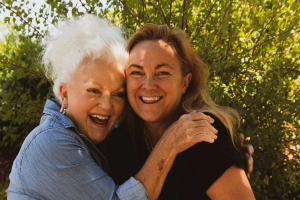Taking care of someone else’s needs can sometimes be a demanding job. Whether you are caring for your young dependent, a disabled child, or your aging parents (or all three), protecting caregiver mental health is critical.
Those in the “sandwich” generation feel the brunt of the stress. Trying to provide high-quality care to both a younger generation (your children or grandchildren) and an older generation (your parents or another relative) while maintaining your own physical and mental health can seem overwhelming. However, there is hope and plenty of ways to ease the stress from those caregiving responsibilities.
Caregiver Mental Health Concerns
 The family caregiver is a common role today. A whopping 43.5 million people in the U.S. are unpaid caregivers to either an adult or a child. 82% of caregivers care for one other adult. Of these primary caregivers, a large portion (75%) are women.
The family caregiver is a common role today. A whopping 43.5 million people in the U.S. are unpaid caregivers to either an adult or a child. 82% of caregivers care for one other adult. Of these primary caregivers, a large portion (75%) are women.
Surprisingly, according to the National Alliance for Caregiving and AARP, the typical caregiver is 49 years old (average range between 18 and 49) with 57% of caregivers feeling that they must shoulder the responsibility of meeting another person’s needs and performing clinical duties.
It’s a struggle. You may spend the morning getting your child off to school, only to make phone calls for your aging mother, followed by an afternoon appointment with your mother-in-law at the pulmonary doctor’s office. Not to mention all your own household tasks, job responsibilities, and relationship issues. It’s no wonder that a large portion (40% to 70%) of caregivers experience symptoms of depression.
Caregivers are at risk for mental health conditions that include depression, anxiety, stress, panic attacks, and complicated grief. Caregiver mental health is just as important as the wellbeing of the caregiving recipient.
What Depression Might Look Like:
 You feel guilty about taking time off from caregiving, although you know you need time away.
You feel guilty about taking time off from caregiving, although you know you need time away.- You have terrible dreams or anxiety about missing your charge’s appointments or medication dosages.
- Your body feels exhausted, but you can’t sleep.
- You’ve lost interest in the things you used to enjoy such as watching your favorite television show or reading books.
- You find yourself losing patience with your charge or other people.
- You notice thoughts about escaping or pick up on suicidal thoughts. If you are experiencing these types of intrusive thoughts, seek help right away.
What Anxiety Might Look Like:
- You carry around physical tension in your upper back, neck, and shoulders.
- When you dwell on your charge’s health, you experience an anxiety attack (shortness of breath, rapid heartbeat, tingling or numbness in the extremities).
- Your mind is constantly trying to make sense of the predicament, so you are filled with fear and worry about the future.
- Your eating patterns change. You may suddenly forget to eat for long periods of time.
- Without warning, you develop panic attacks. The symptoms are like those of anxiety attacks but come on suddenly without you consciously thinking about your loved one.
What Complicated Grief May Look Like:
- After the loss of a loved one who you cared for, you may feel as if you will never get over the loss.
- You still grieve for your charge after the typical bereavement period to the point that it affects other areas of your life.
- You feel intense hurt and pain when you think about your loved one and/or their death.
- You obsess over your loved one’s memories or belongings.
- On the opposite end of the spectrum, you avoid talking about the passing of your loved one or you go out of your way to bypass places your charge loved to go.
- You can’t believe that your loved one is really gone. You may think you are experiencing auditory or visual hallucinations or nightly visits in dreams from your charge.
What Caregiver Stress Syndrome May Look Like:
- Although not recognized as an official mental health condition, you feel the wide range of emotions with caregiver stress: anger, guilt, bitterness, fear.
- You are more likely to feel the effects of the stress if you are the primary caregiver with little help from others.
- You are in danger of developing compassion fatigue. With compassion fatigue, you take on the hurt, trauma, and experiences of your charge creating secondary traumatic stress in yourself.
Caregiving without relief can cause psychological stress and other mental health conditions, but it can also adversely affect your physical health.
Caregiving Also Affects Physical Health
You’re running your loved one to doctor’s appointments (quite possibly to several different doctors) when you begin to feel that maybe you need to see your physician. Caregivers often complain of:
- Digestive issues like reflux, heartburn, and diarrhea.
- Headaches and migraines.
- Hair loss.
- Insomnia
- Weight loss or weight gain.
- High blood pressure.
- Chest pain and rapid heart rate.
- Hives, redness, eczema, and other skin ailments.
- Muscle pain.
- Disinterest in sex.
- Fatigue.
- A higher instance of illnesses like cold and flu.
If you are experiencing any of these symptoms while caregiving for a loved one, consider speaking to your primary physician. The doctor might refer you to a specialist to confirm that your condition isn’t something more than the symptoms of caregiver stress.
For emotional signs of stress, speak to a counselor or therapist who can help you cope with the thoughts, feelings, and tension you will experience from caregiving.
How to Ease the Stress from Caregiving Responsibilities
 It’s important that you ask for caregiver support from friends and family, even if you are the primary caregiver. You may have assumed the role because you believed that it was your responsibility to shoulder it alone. However, others are probably willing to step in and help when you need them. It doesn’t hurt to ask those closest to you.
It’s important that you ask for caregiver support from friends and family, even if you are the primary caregiver. You may have assumed the role because you believed that it was your responsibility to shoulder it alone. However, others are probably willing to step in and help when you need them. It doesn’t hurt to ask those closest to you.
If you can’t find help from friends and family, consider asking for assistance from church members. Many people are willing to lend a hand to another brother or sister in Christ. Elderly caregivers may volunteer to sit with your charge once or twice a week so that you can run errands.
If none of these ideas work, consider hiring help on an as-needed basis. You can find senior care online at local facilities or through organizations that dispatch a caregiver to the home. With facilities, you may need to arrange transportation and/or hours and activities for while your loved one is there. These types of facilities tend to offer meals, games, crafts, special music, and more to entertain your charge while you are gone.
A hired caregiver at home can assist your loved one with daily tasks and keep them company until you return. Some private caregivers can also take your charge to appointments and sit in with them, so you don’t have to miss work.
But how do you de-stress from the caregiving after you’ve found someone to help? By taking the time to remember that you are no good to anyone if don’t take care of yourself. You have to bless yourself before you can bless others.
Take some time to exercise, walk, or bike. Simply moving intentionally every day can relieve stress and boost endorphins, giving you that “runner’s high” that others talk about. Try to work out first thing in the morning, so your mind can feed on those feel-good emotions all day.
 Occasionally get away for a weekend. You need time to escape and rest. Allowing yourself a mini-vacation now and then is good for your body, mind, and soul. This doesn’t have to be a beach vacation in a rental house either. Something small might be all that you need to recharge.
Occasionally get away for a weekend. You need time to escape and rest. Allowing yourself a mini-vacation now and then is good for your body, mind, and soul. This doesn’t have to be a beach vacation in a rental house either. Something small might be all that you need to recharge.
Schedule a “day off” where you make a list of things you want to do by yourself. You could get a manicure/pedicure, get your hair done, visit a museum, eat at a fancy restaurant, or walk through a bookstore with a latte in your hand. Anything that gets you excited about getting out and on your own.
The truth is that you are a person, too. The roles you assume (parent, child, spouse, sibling, etc.) are roles in this life. They do not define who you are as a person. You can take on the responsibility of caring for others as your duty but remember to take care of yourself, too.
Christian Counseling for Caregiver Mental Health
If you’re a caregiver and you’re struggling with your mental health, please contact me or one of the counselors listed in the counselor directory. We would be happy to walk with you as you seek to ease the burdens you face with God’s help.
“Two Men Near Trees”, Courtesy of Logan Weaver, Unsplash.com, CC0 License; “Two Women Near Trees”, Courtesy of Logan Weaver, Unsplash.com, CC0 License; “Woman in Wheelchair”, Courtesy of Raychan, Unsplash.com, CC0 License; “Laughter”, Courtesy of Nathan Anderson, Unsplash.com, CC0 License








